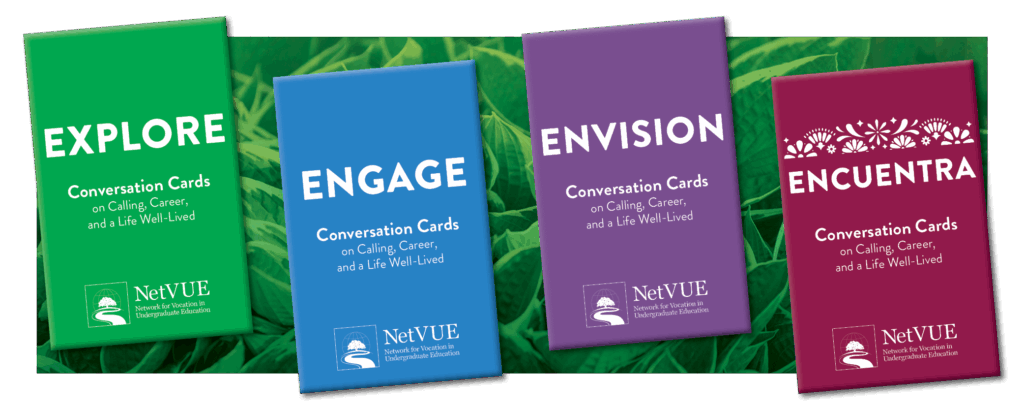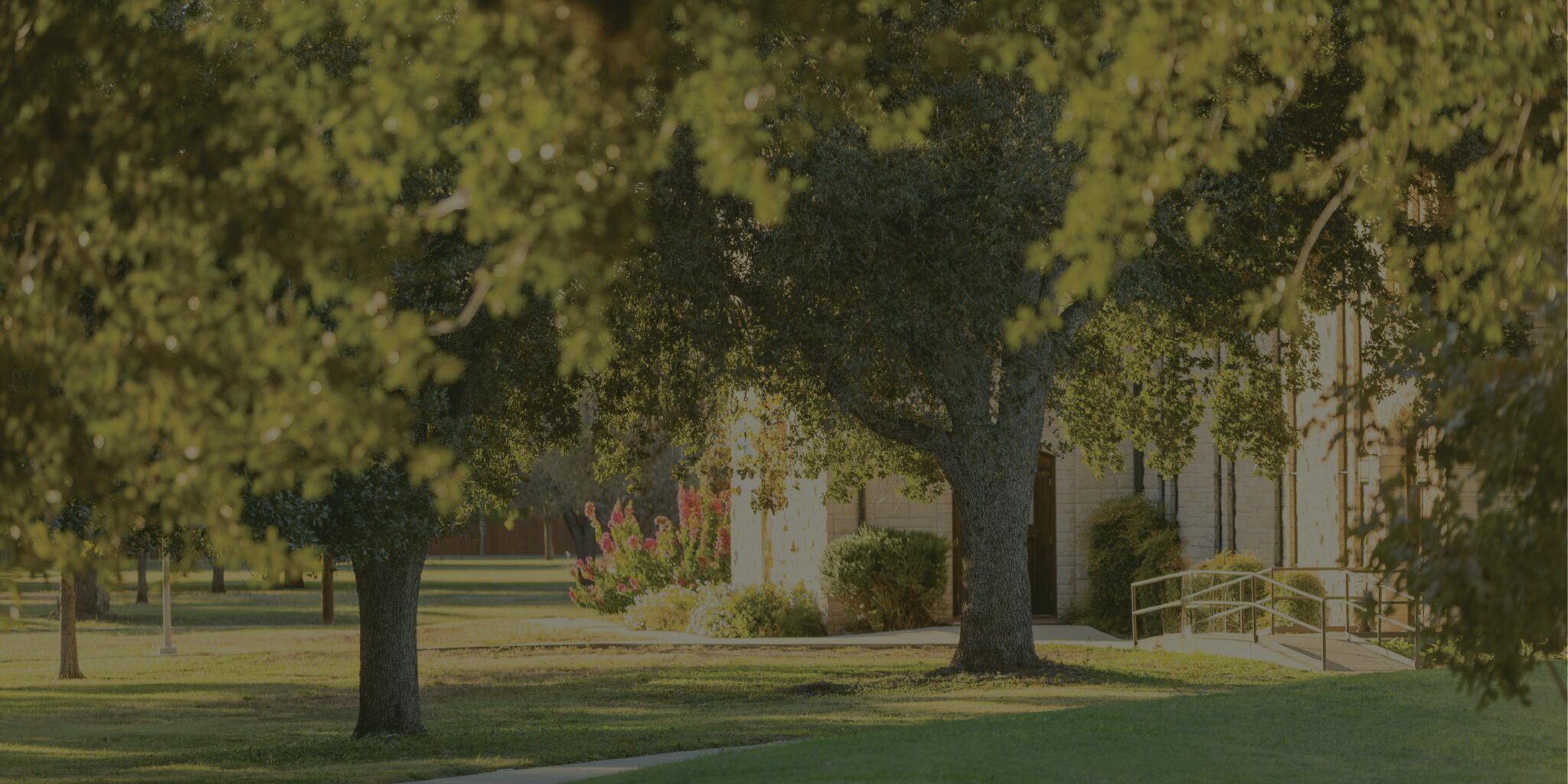Campus Spotlight
NetVUE Conversation Cards: A Tour of Applications and Early Impact
Written by Daniel Meyers, NetVUE Online Network Coordinator

Anyone associated with NetVUE knows that we has been piloting a series of new resources called Conversation Cards—created under the leadership of Krista Hughes, director of resource development. Three decks of cards have been developed, starting with the theme of Explore (the green deck), followed by Engage (blue) and Envision (purple). To get a sense of the different ways the Conversation Cards are being used and to find out what colleagues are learning from the process, we caught up with five different NetVUE campuses to hear about their experiences.

St. Olaf College: peer-to-peer engagement
Peter Carlson Schattauer, associate director of the Lutheran Center for Faith, Values, and Community at St. Olaf, described partnering with SOAR, the college’s first-year experience support program. They hoped to equip peer leaders to use the Explore deck as a tool for opening conversations with first-year cohorts. “The goal is to empower student leaders to feel like they can engage peer-to-peer with vocational exploration,” said Schattauer. The challenge, though, is to determine how to support student leaders so that their peers can get the full potential of the conversations that the cards can foster. Reflecting on his own use of the cards with students, Schattauer recalled a conversation born out of a card that asked students to reflect on something they wanted to do as a child but were discouraged to pursue by the adults in their lives. “Almost everyone shared about some career in the arts or creative expression,” said Schattauer, “which naturally led to societal questions on how we push people towards certain careers and paid work.” The answers to the questions are not the end of the conversation; they are often the starting point to a much broader conversation on vocation and calling. Because St. Olaf is asking students to use the cards with their peers, Schattauer is reflecting on how to equip student leaders to be able to hear and nurture those broader conversations that lie beyond the first answers.

MidAmerica Nazarene University: training faculty members and increasing buy-in
MidAmerica Nazarene University made a large push this past fall to train 60 faculty members on how to use the cards in a variety of settings—including advising appointments, one-on-one conversations, large group discussions, first-year seminars, and advanced courses. Even so, some faculty members were reluctant to use valuable instruction time for this new resource, particularly if their courses did not connect explicitly to vocation. Jennifer Ferguson, associate dean for the school of nursing, spoke about how important it was on their campus to host two faculty check-in sessions, where faculty members could hear from one another on the value of using the cards, as well as hearing from a student panel on the impact. “Students really liked being able to choose the conversation and the flexibility of the cards,” she said. “They also liked talking about things that were important that they had never considered before.” These student perspectives have helped faculty members see the value of the cards, but perhaps the more persuasive feedback has been how the conversations can help transform class time into a more engaged student experience. “While a student may not remember all the content of that day, they remember the experience of the cards,” reflected Ferguson.

Merrimack College: establishing a practice of reflection for all four years
This fall, instructors of all 17 sections of the first-year seminar at Merrimack College received an Explore deck. These courses made use of the cards to center their reflective practice; they were used to form small groups, which led to group discussion, and concluded with hand-written journaling. “The goal,” according to MT Davila, associate professor and chair of religious and theological studies, “is that in three years’ time, every single Merrimack student will go through this particular seminar and encounter these cards, so students will then be ready to engage with the cards in higher-level courses.” The instructors were trained in the summer of 2024, where they encountered the cards through this same practice. One of the advantages Davila noticed emerged in courses with large student enrollment that included group projects. “The cards helped student groups find connections and build trust at the beginning of their group projects, and students were more eager to collaborate,” said Davila. Akin to the experience at MidAmerica Nazarene, Merrimack colleagues are seeing how using Conversation Cards in class increases student productivity. According to Davila, “because the cards help build community and connections, the work and collaboration within the class is stronger. Someone should be researching this!”

Ohio Dominican University: vocational reflection in retreats … and staff meetings too?
Emily Strand, director of campus ministry at Ohio Dominican University, recently held a retreat for her student leaders. Wanting to make use of the limited time together, she decided to use the Conversation Cards over breakfast. “I pulled a few cards to use, but quickly the cards were removed from my hand,” laughed Strand, “and the students wanted to pull from the deck themselves.” The short exercise became a longer-than-planned portion of the retreat, and the students requested that the cards be brought back for the unstructured lunch later in the day. “The quality of the conversation was high—higher than if I had been just posing questions around a table. Students were getting into their pasts, their futures, and their hopes.” The success of the cards at the retreat has led Strand to consider using them in other areas of her work with students. “We have a weekly meeting that is all business,” she said, “where the focus is just getting stuff done. I’ve thought about bringing the cards to these meetings in order to create more of a space for sharing, rather than only a space to delegate tasks.” One of the true strengths of the Conversation Cards is their versatility; in many different settings, they quickly invite deeper vocational reflection. The potential to use them in settings not designed for this kind of reflection (like a meeting) is high, because folks can consider a question, respond, and move on in a short period of time.

Coe College: extending impact and creativity among vocational champions campus-wide
Coe College held a seminar for faculty and staff last May, inspired by the long-running NetVUE faculty seminar but designed specifically for Coe colleagues. The cohort coincided with the release of the first deck of Conversation Cards, so all the participants were introduced to them. Participants were not, however, given a specific formula or practice to guide their use of them. As a result, Coe has created a laboratory in which everyone is finding different ways to use the cards. An education professor is using them specifically in the practicum course for student teachers; various first-year seminar instructors are using the cards to build community; the office of student success and persistence is training college adjustment peers to use the cards with first-year students to support retention efforts; and the assistant registrar is using the cards one-on-one with a work-study student. This variety of uses makes the cards a very dynamic resource! Barb Tupper, associate vice president in development and the C3 office (Creativity, Careers, and Community) co-led the seminar with NetVUE faculty fellow Sam Brown, psychology professor and faculty co-director of C3. Tupper noted the value of having a whole group of faculty members thinking about the new resource together, observing that “the timing was great because the cards came out right as this cohort formed, and they have been asking together how to use the cards.” Coe’s model—providing the cards to those colleagues on campus who are already invested in vocational reflection—allowed the institution to broaden their use. The Conversation Cards can help extend the impact of the network of vocational champions on a campus without having to pre-determine their use. Coe is letting these colleagues identify the applications that work best for them—but in so doing, the institution is creating a cohort with shared experiences.
As the experiences of these five campuses suggest, the Conversation Cards offer a range of important applications and emerging trends that demonstrate their impact on our work. First, they are incredibly versatile in application. The cards create opportunities for reflection in classrooms across curricula, retreats, staff supervision, and peer mentoring. Whatever programming you may have on your campus, there is a good chance the Conversation Cards would work as a companion. Second, the cards seem to increase student engagement. Productivity, participation, and collaboration among students all have the potential to increase, because the cards foster community, trust, and a readiness for the day’s agenda. On campuses that are so busy—and where exhaustion is common—finding tools that bring people out of their malaise and into the moment is essential. The cards can do that. Third, the conversations can go deep quickly. With so many interests competing for our time and attention within higher education, a resource that lets us reflect on bigger, deeper questions within a short period of time is uniquely useful. Rather than needing a full evening’s event for vocational reflection, you may only need an icebreaker. And last, the cards are fun! On each campus, the students were their greatest advocates. As Strand put it, “the students liked the questions; they liked thinking about their lives in the terms the cards posed.” Although this year is the first that the cards have been available, these initial experiments in using them demonstrate great potential for the future.


To report a technical problem with the website, or to offer suggestions for navigation and content issues, please contact Alex Stephenson, NetVUE communications coordinator, at astephenson@cic.edu.



